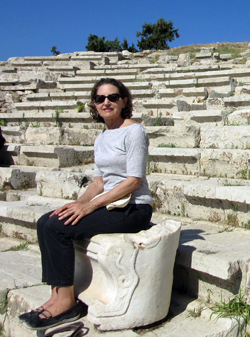Campus News
Studying death in ancient Greece
Last year, UC Santa Cruz received a grant from the National Endowment for the Humanities to undertake a summer institute investigating the history of mortality in ancient Greek culture…




Last year, UC Santa Cruz received a grant from the National Endowment for the Humanities (NEH) to undertake a summer institute investigating the history of mortality in ancient Greek culture.
Directed by Professor of Classics and Literature Karen Bassi–a specialist in ancient Greek literature and history–the four-week institute kicked off last week in Athens, Greece.
Titled Mortality: Facing Death in Ancient Greece, the program brings college and university teachers together with graduate students and experts to examine material from a broad range of ancient Greek literary sources, archaeological remains, and historical periods.
Why study mortality in ancient Greece?
“The topic of the Institute is framed by the Promethean conundrum that humans know they will die but must nevertheless go on living,” Bassi explained.
“The prospects of fearing, facing, and evading death can be found in scholarship on all aspects of ancient Greek culture, including literature, philosophy, religion, art history, the history of medicine, and archaeology.”
Bassi added that the focus of the institute ranges from an exploration of how the ancient Greeks faced death, to current debates over the worth of an individual human life and the question of what is worth dying for.
“We are investigating the link between the quality of one’s life and the contemplation of one’s death in ancient Greece, with an eye to its relevance for comparative study across cultures, disciplines, and historical periods,” Bassi noted.
The participants are taking guided tours of Athens’ museums; the ancient Kerameikos cemetery and museum, with its extensive collection of burial-related artifacts; and the ancient Athenian agora, which began as a cemetery before becoming the marketplace and political center of the city in the 7th century BCE.
Next week they are planning to visit the Peloponnesus to visit sites that have direct relevance to the lectures and seminars, including the sanctuary and temple of the healing god Asclepius at Epidaurus and the monumental gravesites at Mycenae.
They will also be attending a performance of Aeschylus’ Prometheus Bound at the ancient theater of Epidaurus.
Bassi is the recipient of a University of California President’s Fellowship in the Humanities and an Associate Research Fellow at Harvard’s Center for Hellenic Studies.
She received her B.A. in Classics from UC Santa Cruz in 1980 and her Ph.D. in Classics from Brown University in 1987.
Bassi joined the UC Santa Cruz faculty in 1989. She was recently chair of the Literature Department (2008 to 2012) and has been director of the Classics program, and director of the Educational Abroad Program in the Netherlands.
Her interest in the history of mortality stems from her latest book project, currently titled Seeing the Past/Reading the Past: Classics Between Archaeology and History.
_______________________________________________________________________________________________
The NEH Institute is sponsored by the UC Santa Cruz Institute for Humanities Research in collaboration with the Athens Centre, The American School of Classical Studies, The Canadian Institute in Greece, and The Centre for Hellenic Studies in Nafplion.